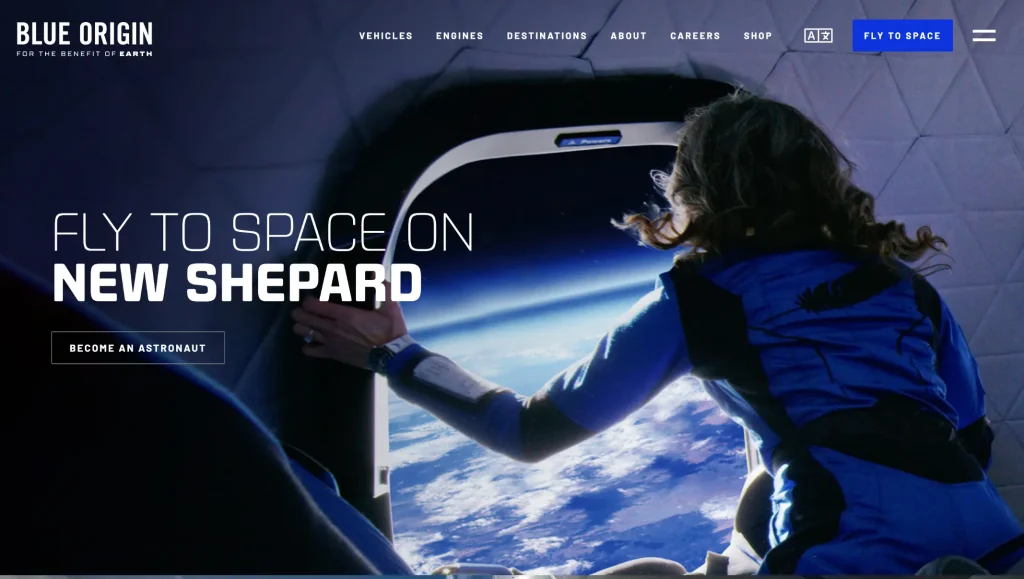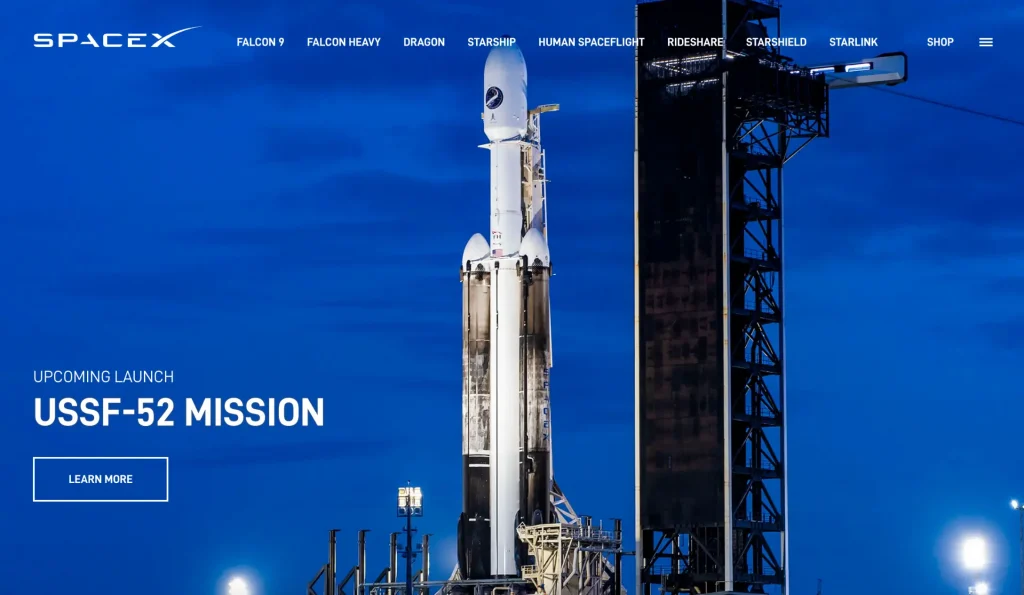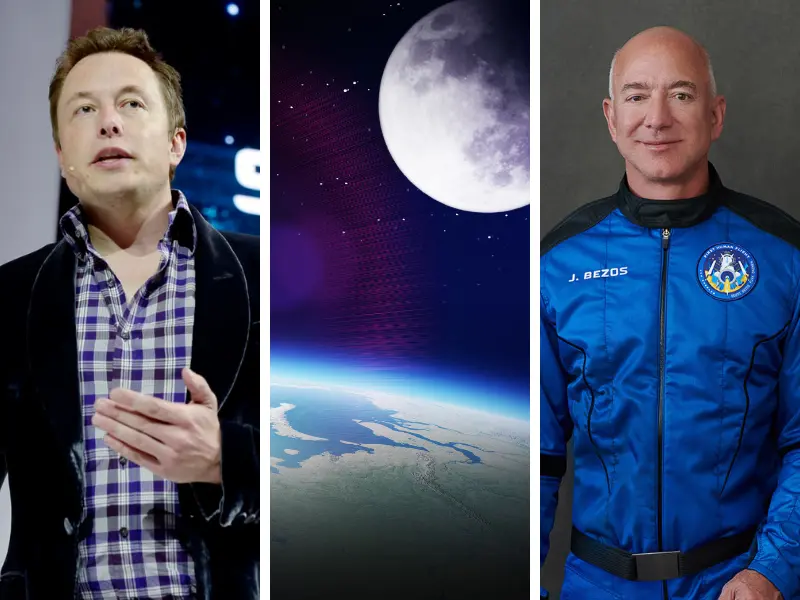- Blue Origin, led by Jeff Bezos, resumes New Shepard launches on Dec 18 after a 15-month pause.
- New Shepard faces competition from SpaceX’s advanced rockets and spacecraft.
- Blue Origin’s success may hinge on diversifying with satellite launches or space station missions.
In a highly anticipated move, Jeff Bezos’ Blue Origin is set to relaunch its New Shepard suborbital rocket after a hiatus of more than 15 months. The successful recent space journey of the Amazon founder himself marked a significant milestone, as he fulfilled a dream harbored since the age of 18. Following this success, Bezos has announced plans to send six astronauts on the “New Shepard” rocket, sparking speculation about a potential rivalry with Elon Musk’s SpaceX.
Blue Origin aims to end the 15-month suspension of its New Shepard suborbital rocket with an unmanned flight scheduled for December 18th. The New Shepard rocket is a fully reusable spacecraft designed for human spaceflight. Despite being a traditional single-stage rocket, its unique design involves the separation of the crew capsule from the main rocket body well before fuel depletion, ensuring a safe landing. The “New Shepard” essentially functions as a suborbital spaceplane, propelling passengers to the edge of space for a brief but awe-inspiring experience before returning to Earth with the help of thrusters and parachutes.
But as the space race heats up once again, we have to ask: what is the point?
Is space tourism so important?
Bezos and Musk, two egoistic billionaires, have been embroiled in a rocket rivalry that has consumed a substantial amount of financial resources and time. We are not including Richard Branson’s Virgin Galactic in our discussion here, as his vision is to fly no higher than 80km, technically not actual ‘space’. Bezos intends to go up to 100km and Musk has his sights set on 400 km.
On one hand, the excessive utilization of societal resources appears to be a pursuit exclusive to the affluent, with no discernible benefits for the broader public in the foreseeable future. However, both individuals share a fervor for space reminiscent of the industrial magnates of a bygone era, and their competitive spirit serves to drive advancements in human space exploration.
Despite criticisms that space has become a playground for the hobbies of these billionaire magnates, their efforts have successfully rejuvenated America’s standing in space exploration, a domain where the country had fallen behind China and, indeed, even Russia. This has been achieved by realizing their vision of rocket launches through privately-owned companies.

Also read: Billionaire investor Ron Baron goes long on SpaceX, predicts $500 billion valuation by 2030
Contrasting strategies in space exploration
However, surpassing Musk’s SpaceX in the space exploration realm poses challenges for Blue Origin. SpaceX’s Falcon 9 rocket boasts two stages, each equipped with its own landing apparatus for recovery on sea platforms. Additionally, SpaceX’s Dragon spacecraft has already achieved docking with the International Space Station and conducted resupply missions.

According to Bloomberg, Blue Origin confirmed the new target date for the NS-24 mission, which will carry 33 scientific research payloads and other cargo. The New Shepard has been grounded since September 2022 when an engine nozzle issue triggered an automatic abort, separating the unmanned capsule from the booster. While the capsule safely landed, the booster was destroyed during its descent to Earth. The upcoming mission, NS-24, is also unmanned.
Also read: SpaceX’s Starlink finally breaks even, Musk says
FAA investigation closure and Blue Origin’s compliance
The Federal Aviation Administration concluded its investigation into the incident in September, directing Blue Origin to implement 21 corrective measures, including redesigning engine and nozzle components and implementing organizational changes.
The newly announced launch date implies that Blue Origin has taken all necessary actions and obtained a modified launch license from the FAA. The updated permit is set to expire in August 2025 and is restricted to launches from Blue Origin’s West Texas facility.
Beyond New Shepard: Blue Origin’s ambitious projects
Despite ambitious projects in development, such as the heavy-lift New Glenn rocket slated for launch next year and the lunar lander Blue Moon, which secured a $3.4 billion contract with NASA, the New Shepard flight plan remains the only operational project for Blue Origin. With over 22 flights and 31 individuals, including CEO Jeff Bezos, experiencing suborbital space travel, Blue Origin aims to establish itself in the burgeoning field of commercial space tourism.
Competing in the crewed spaceflight arena
To compete with SpaceX in crewed spaceflight, Blue Origin may need to intensify its research and development efforts, possibly initiating satellite launch missions or space station resupply missions. This strategic move not only generates additional resources but also attracts interest from countries seeking satellite launch services. Only by building a robust customer base can Blue Origin hope to match SpaceX in rocket production capacity and reputation, thus attracting top talent for its crewed spaceflight endeavors.
However this race ends, it is no doubt exciting, taking humanity beyond its Earthly limits. But we hope the expenditure of both finances, and human resource, will not be in vain, going up like a puff of sub-orbital dust.

